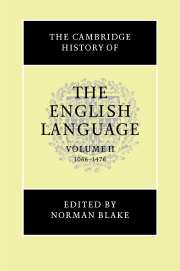3 - MIDDLE ENGLISH DIALECTOLOGY
Published online by Cambridge University Press: 28 March 2008
Summary
Dialectology is more central to the study of Mfiddle] Efnglish] than to any other branch of English historical linguistics.
Strang (1970: 225)Dialect method and the study of Middle English
Introduction
The most striking fact about Middle English is that it exhibits by far the greatest diversity in written language of any period before or since. Before 1100 – in the Old English period – extant written sources for the study of variation are rather sparse, and much of the Late Old English literary output is in a relatively invariant West Saxon literary language. Similarly, close to the end of the Middle English period (in the fifteenth century), we witness the rise and subsequent spread of a relatively uniform written variety – the beginnings of ‘standard English’. From that century onward, the vast bulk of printed documents is in this variety, regardless of the geographical provenance of the author: documents do not readily betray their region of origin, and the dialectal diversity that continued to exist in speech is suppressed in writing. For this reason, much of our knowledge of Early Modern English variation depends much more on indirect evidence, such as contemporary commentaries on pronunciation (on which see especially Dobson 1968), and much less on variable forms attested in the texts themselves. For written Middle English, on the other hand, our access to variation is direct, and it is this primary source that we use to reconstruct the diversity of spoken Middle English.
Variability in written Middle English is very wide-ranging at every linguistic level: spelling, morphology, syntax and lexicon. There are also several non-linguistic dimensions in which this variation can be observed. Of these, the geographical and chronological dimensions are most immediately obvious: texts from different areas are different, and later texts differ very markedly from earlier ones (for some examples see Lass in this volume).
- Type
- Chapter
- Information
- The Cambridge History of the English Language , pp. 156 - 206Publisher: Cambridge University PressPrint publication year: 1992
References
- 16
- Cited by

